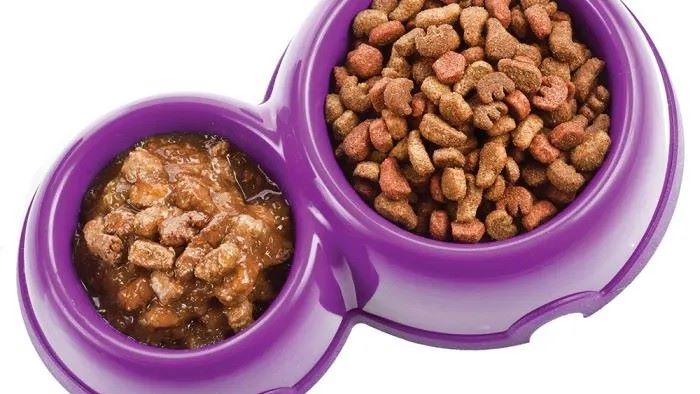Every paw parents want to feed their fur baby the best possible food that can help them stay healthy and promote growth. But do you know that for different growth stages in life, the food differs according to the dog’s nutritional needs? So if you have a senior dog then you might think, “What is the difference between senior dog food and regular?”
Through our blog, we will provide you with all the necessary information. We will try to enlighten you so you can ensure your senior dog’s health remains good.

What is the difference between senior dog food and regular?
Here’s the difference between the senior dog food and regular dog food[1]:
Ingredients
Senior dog food:
Most of the ingredients in the senior dog food are quite similar to the regular dog food. The core ingredients of both the senior dog food and regular dog food are formulated in a similar way.
This makes it easy for the dog to adapt and digest the food easily when switched. The only difference here is that the senior dog food might not come in various flavours.
Regular dog food:
Regular dog food is formulated with protein, grains, vegetables, fruit and meat. This formulation is required for the proper growth of the dog. Regular dog food comes in a variety and ingredients also differ as the dog’s preference.
Nutritional requirement
Senior dog food:
The senior dogs have restricted physical activity owing to their condition and age, which results in decreased metabolism in them. The senior dog food is thus low in calories by keeping in mind the fact of low metabolism in older dogs.
Some of the senior dog foods are also less in protein and may vary according to the needs of your dog.
Regular dog food:
The calorie content in regular dog food is higher as compared to the senior dog food to support the requirement of the adult dog. Regular dog food is a perfect blend of protein, carbohydrates, fat and other required nutrients. These nutrients help to promote good health in dogs.
Additional supplements
Senior dog food:
Glucosamine and fatty acids are the additional supplements that are mostly included in dog food. These additional supplements benefit the senior dog by providing support to maintain their joint health. Some additional supplements in the senior dog food are also essential to provide the dog with mental benefits and boost their memory.
Regular dog food:
Regular dog food contains the normal ingredients and there are no as such additional supplements added to it. This type of regular dog food is already rich in nutrients and is designed to provide dogs with all the required benefits.
As mentioned by Mindy Cohan, VMD in petmd, “When it comes to choosing an appropriate diet for your pet, it is important to consider your pet’s age, body condition, medical problems and even breed. It is also important to be sure your pet’s food includes a statement from the Association of American Feed Control Officials (AAFCO), which indicates that the diet has either been tested via food trials or has been analyzed to meet nutritional guidelines.”
How Diet Can Help Manage Age-Related Conditions

For senior dogs, it is really important to have a proper diet that fulfils the requirements of theirs. A proper well-managed diet helps them stay fit and deal with age-related conditions. Here’s the benefit of diet for senior dogs:
Weight management
With a proper diet, you can easily manage your dog’s weight. If your senior dog is obese then you can provide him with a reduced-calorie diet. This low-calorie diet will help to lose weight, especially for dogs with slower metabolism and reduced activity.
With proper weight management, the senior dog will get relief from the joint issue. This also helps to prevent and manage arthritis and other mobility issues in your dog.
Muscle health
Muscle health is a very important aspect of a dog’s life as it helps to maintain their mobility. Providing your dog protein with a protein-rich diet ensures their muscle health is good. Not only this but a diet with ample amounts of protein helps the dog to gain strength.
Gastrointestinal health
As the dog gets old their ability to digest the food reduces, this is why it is important to feed the senior dog the food that can be easily digestible. Increasing the fibre content in your senior dog food will help to avoid issues like constipation and diarrhoea.
This high-fibre diet helps the senior dog with easy digestion and promotes regular bowel movement.
Joint health
It is very important to include glucosamine and omega-3 fatty acids in your dog’s diet. This supplement helps senior dogs with joint stiffness and deal with other joint-related issues too. Adding this to your dog’s diet helps to reduce the inflammation of your dog’s joints.
Dental care
Diet plays a key role in influencing the dog’s dental health. The food’s texture matters a lot as if it gets stuck in the teeth it will lead to plaque and tartar buildup. Apart from this, it becomes extremely difficult for the senior dog to chew the hard and dry food.
Organ functioning
Senior dogs are weak and need extra nutrients as compared to the adult dogs. As the dogs age so do their organs, this is why it is important to provide them with a proper diet. Adding DHA and EPA to your dog’s diet will help with proper brain functioning and promote cardiovascular activities.
Vitamin C and vitamin E protect the senior dog from cognitive decline, whereas adding phosphorus and sodium helps in the functioning of the kidney and liver.
FAQs
What is the difference between senior dog food and regular?
Due to their slower metabolisms and tendency to be less active, senior dog diets often include lower calorie contents to help prevent weight gain. Some feeds for older dogs may have less protein than others, while some foods keep protein high to maintain muscle mass.
Does my dog really need senior dog food?
Several factors, such as your dog’s health, activity level, and nutritional requirements, will decide whether or not your dog requires senior dog food. In general, senior dog diets have been created to address typical health issues that older dogs have, such as digestive efficiency, joint health, and weight control.
When should dog switch to senior food?
Dogs age differently and have different health needs, so choosing to transfer them to senior food shouldn’t be based just on their age. Your dog might not need to switch to senior food if they are in good health and is getting a nutritionally sound, well-balanced diet. Senior diet, however, could be helpful if they suffer age-related problems.
Is senior dog food easier to digest?
Yes, the majority of the time, senior dog food is made to be simpler to digest. Senior dog diets are made with keeping in mind that an ageing dog’s digestive tract may become more delicate. They may contain probiotics and prebiotics to maintain a healthy gut microbiota and enhance digestion, and they frequently contain substances that are easy on the stomach.
How many times a day do you feed a senior dog?
Providing two meals a day, one in the morning and one in the evening, is normally advised for senior dogs. This aids in keeping a consistent eating schedule, which is good for their general health and metabolism. Individual demands do, however, differ, so it’s important to speak with the vet to determine a feeding plan that suits your dog’s needs.
Conclusion
We hope through our blog, “What is the difference between senior dog food and regular?” we have made you understand the difference between them. The regular dog is formulated keeping in mind the requirements of the adult dog. As compared to adult dogs senior dogs require a lot more nutrients which a regular dog food cannot provide them.
If you are confused regarding your senior dog’s nutritional requirement then you can consult a vet
Reference:
- Nutrition – General Feeding Guidelines for dogs | VCA Animal Hospital | VCA Animal Hospitals. (n.d.). Vca.



